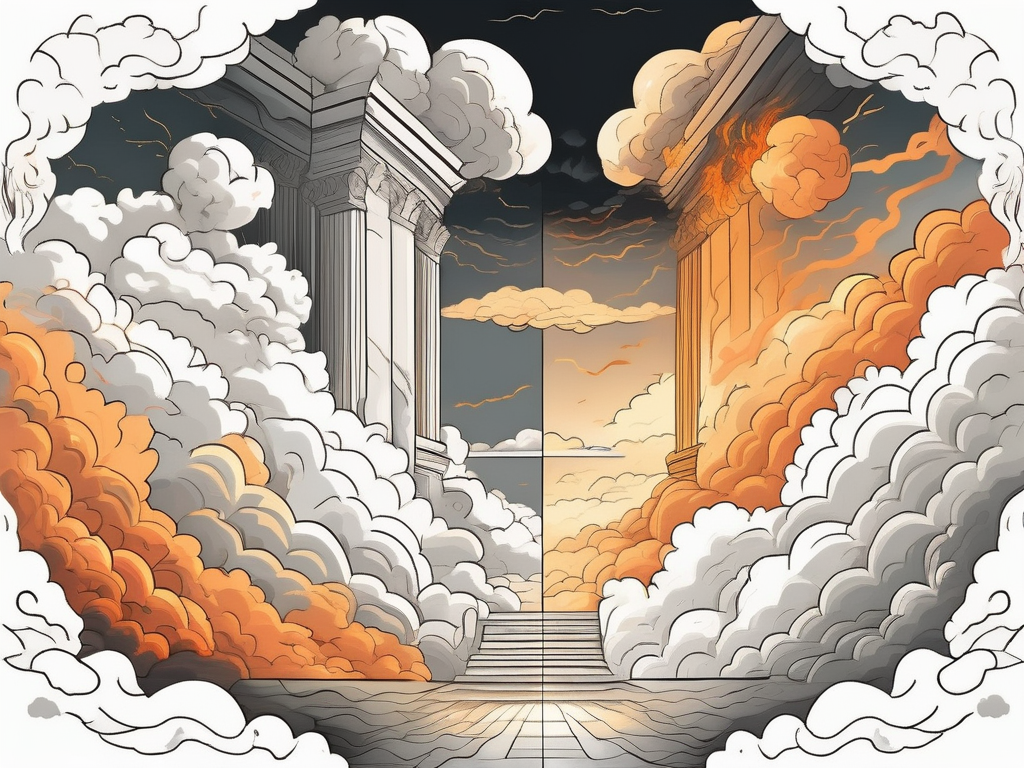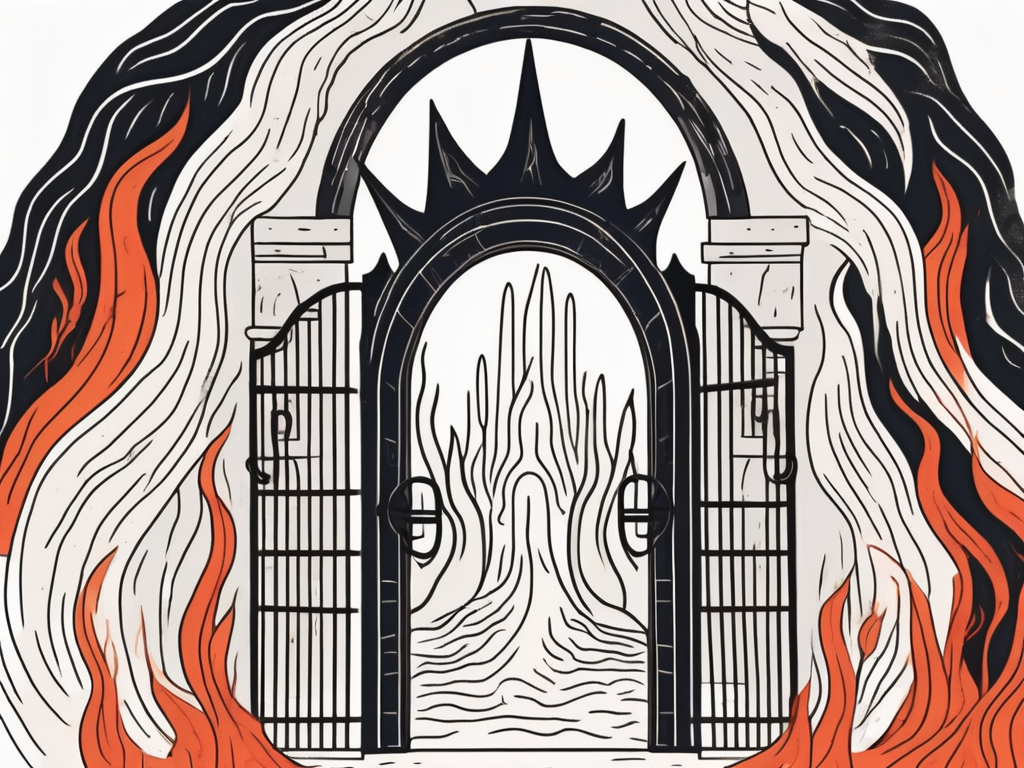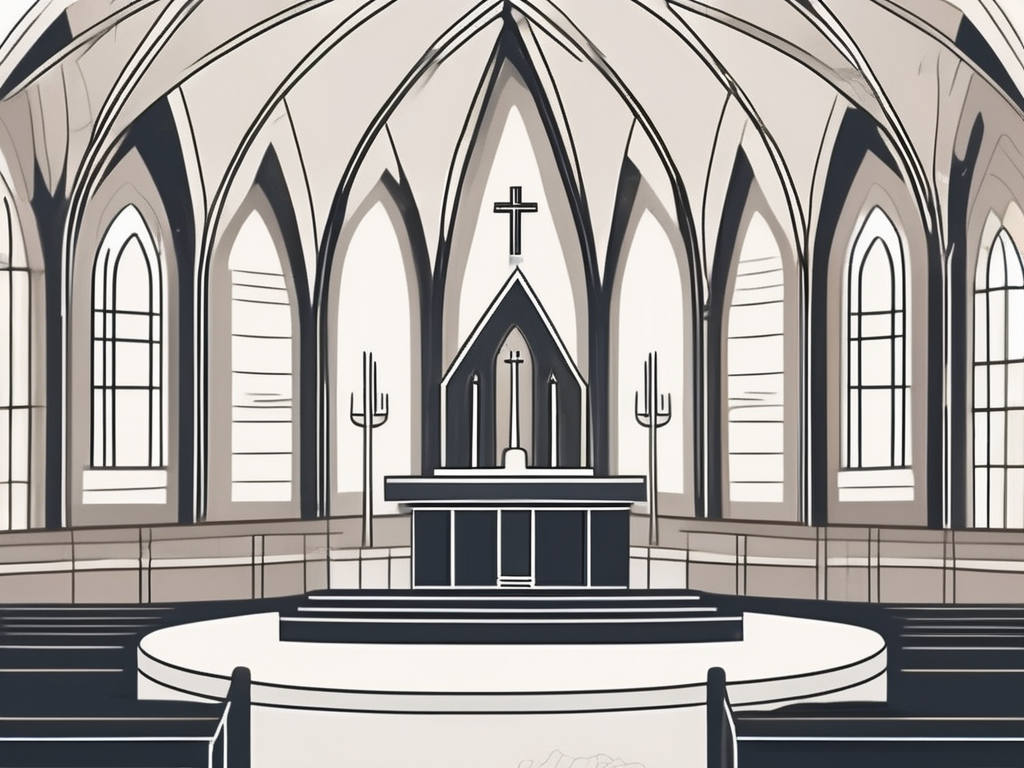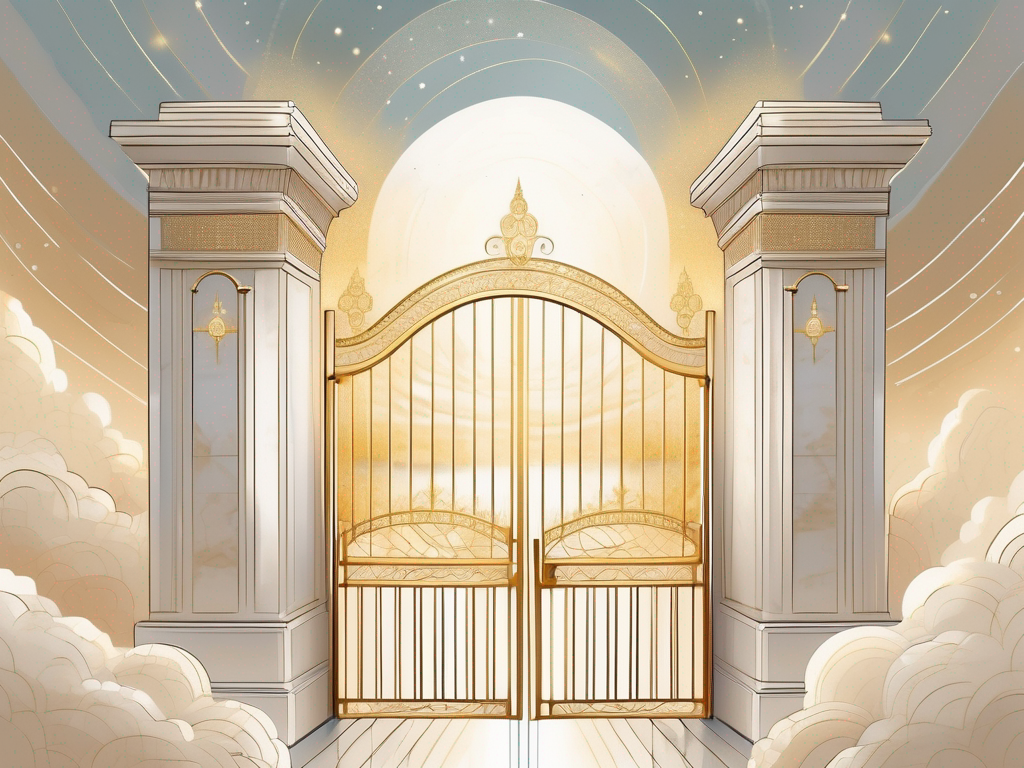The concept of the afterlife has been an enduring aspect of religious belief for centuries. In Judaism, the afterlife holds a unique place, with a rich tapestry of ideas and perspectives surrounding this topic. In this comprehensive guide, we will dive into the fascinating world of Jewish afterlife beliefs, exploring the theological foundations, different denominational perspectives, the concept of resurrection, the Jewish view on heaven and hell, and the role of afterlife beliefs in rituals and practices.
Understanding the Concept of Afterlife in Judaism
Judaism, with its diverse traditions and interpretations, offers a multifaceted view of the afterlife. To grasp the depth of Jewish afterlife beliefs, it is essential to explore the theological foundations that underpin these beliefs.
Theological Foundations of Jewish Afterlife Beliefs
At the heart of Jewish afterlife beliefs lies the core concept of the soul. According to Jewish teachings, each individual possesses a divine spark, an eternal and immortal soul that transcends physical existence. This soul is believed to continue its journey even after death, entering the realm of the afterlife.
One of the key theological foundations of Jewish afterlife beliefs is the concept of Olam Ha-Ba, which translates to “the World to Come.” This concept refers to the future state of existence where the righteous will be rewarded and the wicked will face punishment. It is believed that in Olam Ha-Ba, the soul experiences a higher level of closeness to God and is rewarded for its righteous deeds during its earthly life.
Another theological foundation is the belief in resurrection. While not universally accepted in Judaism, some interpretations hold that at the end of days, the dead will be resurrected and reunited with their bodies. This belief is based on the idea that the body and soul are intrinsically connected and that the ultimate redemption includes the physical realm.
However, Jewish afterlife beliefs vary widely across different interpretations and denominations. Let’s take a closer look at these varying perspectives.
Varying Perspectives on Jewish Afterlife Beliefs
Within Judaism, there are different interpretations and understandings of the afterlife. Orthodox Judaism, for example, emphasizes the importance of following Jewish law and believes in a literal resurrection of the dead. According to this perspective, the righteous will be resurrected and rewarded in Olam Ha-Ba, while the wicked will face punishment.
Conservative Judaism takes a more nuanced approach, acknowledging the diversity of beliefs within the Jewish tradition. While some Conservative Jews may hold similar beliefs to Orthodox Judaism, others may interpret the afterlife metaphorically or focus more on the impact of one’s actions in this world rather than the next.
Reform Judaism, on the other hand, tends to place less emphasis on the afterlife and focuses more on the importance of leading a meaningful and ethical life in the present. While Reform Jews may hold a variety of beliefs regarding the afterlife, the emphasis is often on the here and now, and the pursuit of justice and social action.
Additionally, mystical traditions within Judaism, such as Kabbalah, offer unique perspectives on the afterlife. These traditions delve into the mystical realms of Jewish thought and explore concepts such as reincarnation and the ascent of the soul through different spiritual realms.
It is important to note that while there are varying perspectives on the afterlife within Judaism, the focus is often on how one lives their life in the present and the ethical responsibilities they have towards others. The afterlife, in many ways, serves as a reminder of the ultimate consequences of one’s actions and the importance of leading a righteous life.
Different Perspectives on Afterlife in Jewish Denominations
Judaism encompasses a spectrum of beliefs, and this is evident in the diversity of afterlife perspectives within the different denominations.
Understanding the various perspectives on the afterlife within Jewish denominations provides insight into the rich tapestry of Jewish thought and belief. Each branch offers its unique interpretation, reflecting the diverse ways in which individuals connect with their faith and understand the mysteries of what lies beyond.
Orthodox Judaism and the Afterlife
In Orthodox Judaism, the belief in an afterlife is strongly emphasized. This branch holds firm to traditional teachings, with a focus on reward and punishment in the world to come. The righteous are thought to be rewarded in Gan Eden (Heaven), while the wicked may experience Gehinnom (Hell) as a form of purification.
Orthodox Jews find solace in the idea that their actions in this world have eternal consequences. The concept of an afterlife serves as a powerful motivator for leading a righteous life, as it is believed that one’s deeds will ultimately determine their fate in the world to come. This belief in divine justice brings comfort to many Orthodox Jews, providing them with a sense of purpose and moral guidance.
Conservative Judaism and the Afterlife
Conservative Judaism approaches the afterlife with a degree of flexibility, allowing for individual interpretation. While some adherents hold to traditional beliefs similar to Orthodox Judaism, others view the afterlife metaphorically, emphasizing the importance of worldly actions and ethical living.
Within Conservative Judaism, there is room for personal reflection and exploration of the afterlife. Some adherents find comfort in the traditional teachings of reward and punishment, while others see the afterlife as a metaphorical representation of the impact one leaves on the world. This allows individuals to focus on the present and strive to make a positive difference in the lives of others, rather than being preoccupied with thoughts of what may come after death.
Reform Judaism and the Afterlife
Reform Judaism takes a progressive approach to afterlife beliefs, focusing more on the concept of an eternal legacy. The emphasis lies on how one’s memory and impact continue to live on in the deeds and influence left behind.
For Reform Jews, the afterlife is seen as a collective memory and a lasting impact on future generations. The focus is on the importance of leading a meaningful life in the present, rather than being preoccupied with thoughts of an individual afterlife. Reform Jews find solace in knowing that their actions can have a lasting effect on the world, shaping the future and leaving behind a positive legacy for generations to come.
By embracing this perspective, Reform Jews are encouraged to engage actively in social justice and community service, as they believe that these actions have the power to create a better world for all. The afterlife, in this context, becomes less about personal reward or punishment and more about the collective responsibility to repair and improve the world.
These different perspectives on the afterlife within Jewish denominations highlight the richness and diversity of Jewish thought. While some focus on the individual’s fate in the world to come, others emphasize the importance of ethical living and leaving a lasting impact. Regardless of the specific beliefs held, the concept of the afterlife serves as a source of comfort, guidance, and motivation for Jews across the denominational spectrum.
The Concept of Resurrection in Jewish Beliefs
Resurrection holds a significant place in Jewish afterlife beliefs, presenting intriguing ideas about the restoration of the body and a renewed existence.
Resurrection in Jewish Texts
Jewish texts, such as the Talmud and Kabbalistic writings, explore the concept of bodily resurrection. While the specifics may vary, there is a shared belief in the ultimate reunification of body and soul, culminating in a transformed state.
Interpretations of Resurrection in Modern Judaism
In modern Judaism, interpretations of resurrection have evolved with a more metaphorical and symbolic understanding. Many see resurrection as a metaphor for the memory and ongoing impact an individual has on future generations.
The Jewish View on Heaven and Hell
The concepts of heaven and hell in Judaism offer profound insights into the Jewish understanding of the afterlife.
Gan Eden: The Jewish Concept of Heaven
Gan Eden, often referred to as the Garden of Eden, is perceived as a blissful realm of reward for those who have lived righteous lives. It is a place of joy, where the soul finds rest and fulfillment in the divine presence.
Gehinnom: The Jewish Concept of Hell
Gehinnom, sometimes translated as hell, is not viewed as a place of eternal damnation but rather as a state of purification. It is believed that the soul goes through a process of cleansing before eventually ascending to higher spiritual realms.
The Role of Afterlife Beliefs in Jewish Rituals and Practices
Jewish afterlife beliefs influence various rituals and practices, providing a framework for understanding life, death, and the continuity of the soul.
Mourning Practices and the Afterlife
The rituals surrounding mourning, including shiva and recitation of the Kaddish prayer, reflect the belief in the afterlife and the journey of the soul. These practices provide comfort to the bereaved by affirming the eternal nature of the soul and the hope of reunion in the afterlife.
The Role of Afterlife in Jewish Ethics and Morality
Afterlife beliefs play a crucial role in shaping Jewish ethics and moral behavior. The understanding that actions in this life have consequences in the afterlife serves as a motivator for leading a righteous and ethical life.
In conclusion, Jewish afterlife beliefs offer a wealth of perspectives and interpretations that have shaped the Jewish faith throughout history. Whether it is the theological foundations, denominational views, concepts of resurrection, views on heaven and hell, or the role of afterlife beliefs in rituals and practices, exploring Jewish afterlife beliefs provides a fascinating glimpse into the profound and enduring nature of the Jewish faith.












